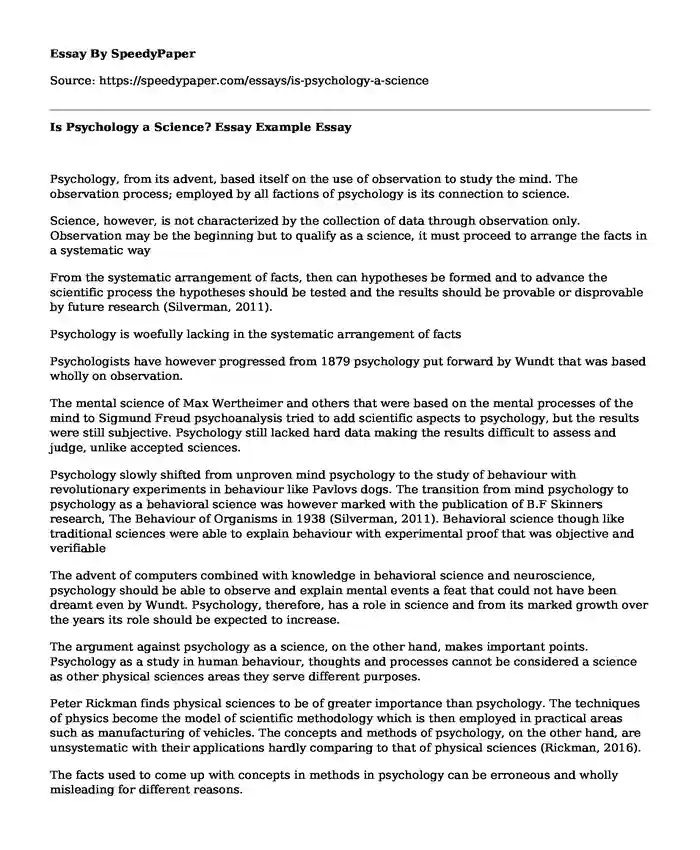
| Type of paper: | Essay |
| Categories: | Psychology Science |
| Pages: | 3 |
| Wordcount: | 730 words |
Psychology, from its advent, based itself on the use of observation to study the mind. The observation process; employed by all factions of psychology is its connection to science.
Science, however, is not characterized by the collection of data through observation only. Observation may be the beginning but to qualify as a science, it must proceed to arrange the facts in a systematic way
From the systematic arrangement of facts, then can hypotheses be formed and to advance the scientific process the hypotheses should be tested and the results should be provable or disprovable by future research (Silverman, 2011).
Psychology is woefully lacking in the systematic arrangement of facts
Psychologists have however progressed from 1879 psychology put forward by Wundt that was based wholly on observation.
The mental science of Max Wertheimer and others that were based on the mental processes of the mind to Sigmund Freud psychoanalysis tried to add scientific aspects to psychology, but the results were still subjective. Psychology still lacked hard data making the results difficult to assess and judge, unlike accepted sciences.
Psychology slowly shifted from unproven mind psychology to the study of behaviour with revolutionary experiments in behaviour like Pavlovs dogs. The transition from mind psychology to psychology as a behavioral science was however marked with the publication of B.F Skinners research, The Behaviour of Organisms in 1938 (Silverman, 2011). Behavioral science though like traditional sciences were able to explain behaviour with experimental proof that was objective and verifiable
The advent of computers combined with knowledge in behavioral science and neuroscience, psychology should be able to observe and explain mental events a feat that could not have been dreamt even by Wundt. Psychology, therefore, has a role in science and from its marked growth over the years its role should be expected to increase.
The argument against psychology as a science, on the other hand, makes important points. Psychology as a study in human behaviour, thoughts and processes cannot be considered a science as other physical sciences areas they serve different purposes.
Peter Rickman finds physical sciences to be of greater importance than psychology. The techniques of physics become the model of scientific methodology which is then employed in practical areas such as manufacturing of vehicles. The concepts and methods of psychology, on the other hand, are unsystematic with their applications hardly comparing to that of physical sciences (Rickman, 2016).
The facts used to come up with concepts in methods in psychology can be erroneous and wholly misleading for different reasons.
Most of the evidence used in behavioral sciences is not observable facts as in physical sciences but rather communications from the respondents. The process of communication is complicated and could yield erroneous data. In fact, the data can hardly ever be verified as truth. Respondents are motivated by other factors apart from helping the research along for example pride, embarrassment, fear or exasperation. It is hardly likely that the respondents primary motive is to give factual information (Rickman, 2016). The respondent himself may in fact not be aware that the information is not factual as his opinions of himself may differ from the truth of himself.
Psychology must, therefore, be able to deal with the problems of the communication process so as to raise facts from their observations and not just mere communications.
Psychology bases its insights on observation of individuals yet individuals vary in widely in personality, motivations, and goals
An experiment in physical sciences is aimed to help from general laws and can indeed achieve this in human studies, on the other hand, the individual thing considered it may be a person, a family or a whole community remains of interest and the results cannot be universal. An attempt to classify human beings to come up with universal laws for the classification is also impossible as a single classification is inadequate and stereotypical.
This argument leads to critical questions into the role of science in psychology. To begin with, can researchers in the field of psychology obtain data through methods that do not involve interviewing respondents?
Is it possible to come up with laws that apply to human beings as a whole?
What role has psychology played in neuroscience, mental health, and other critical areas?
References
Rickman, P. (2016). Is Psychology Science? | Issue 74 | Philosophy Now.Philosophynow.org. Retrieved 28 August 2016, from https://philosophynow.org/issues/74/Is_Psychology_Science
Silverman, R. E. (2011). Is psychology a science? Skeptic, 17(1), 36.
Cite this page
Is Psychology a Science? Essay Example. (2019, Oct 24). Retrieved from https://speedypaper.com/essays/is-psychology-a-science
Request Removal
If you are the original author of this essay and no longer wish to have it published on the SpeedyPaper website, please click below to request its removal:
- Free Essay Sample on Heroin Effects
- Person-centered Therapy - Free Essay in Psychology
- Global Marketing and Communication Essay, Free Example
- Deploy and Administer Windows Server 2012
- Research Proposal Paper Sample: Determining the Role of the DPP9 Enzyme
- Essay Example Exploring Impacts of Pop Culture on the Youth
- Business Case Studies and Analysis
Popular categories




